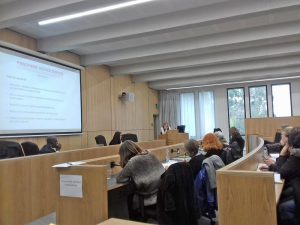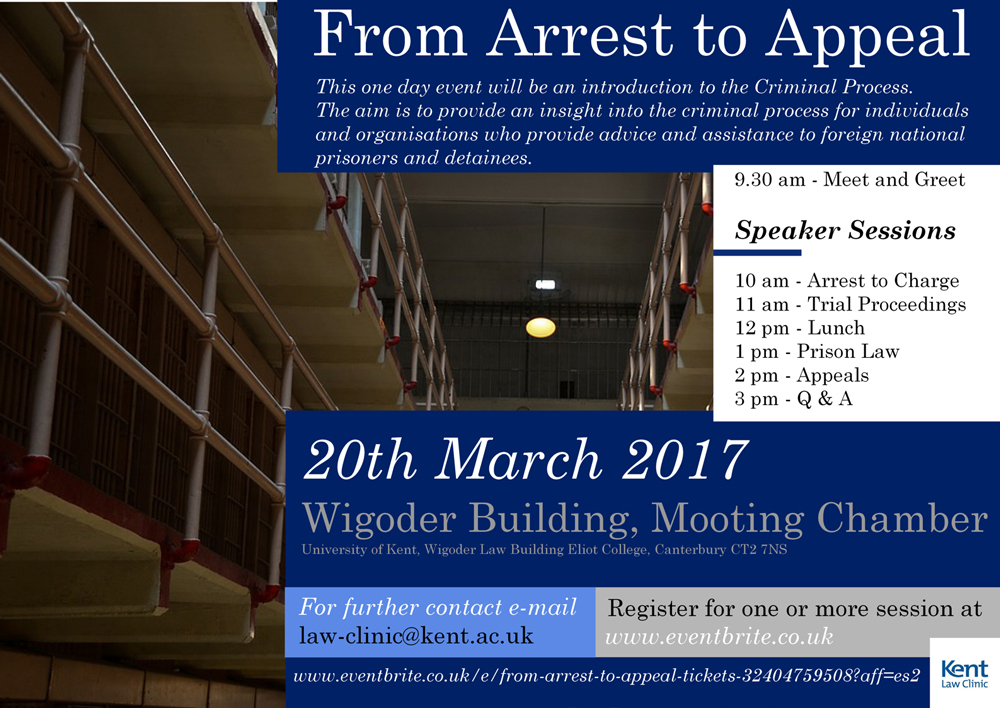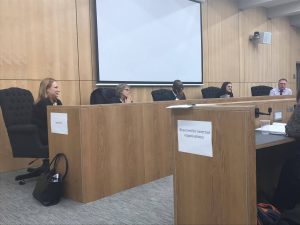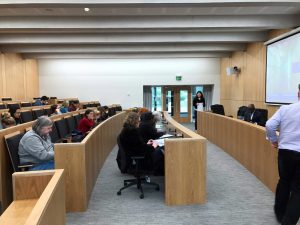A one-day event offering an insight into the UK criminal justice process for individuals and organisations supporting foreign national prisoners and detainees was hosted last week by a team of students from Kent Law Clinic.
The event, ‘From Arrest to Appeal’ featured presentations by legal professionals as well as contributions from the Prisoner’s Advice Service (PAS) and the Criminal Cases Review Commission (CCRC). It was held in the Moot Room on the upper floor of the Wigoder Law Building, the new home for Kent Law Clinic.
Students working in Kent Law Clinic’s Criminal Justice Project (CJP) were prompted to organise the event after receiving a request for advice on the criminal process from Kent Refugee Help (KRH), a local organisation helping to support refugees and migrants in prison. KRH contacted the Law Clinic in the hope of seeking a better understanding of the legal issues that could help them to support refugees and migrants who are imprisoned, detained and on trial.
Supported by Law Clinic Solicitor Hannah Uglow, the students compiled a comprehensive information pack and enlisted the involvement of expert speakers. They also decided to open up the free event to other organisations in the community working in prisons as well as to fellow Kent Law School students.
The day began with a presentation on the process from arrest to charge by Chidi Umez from CK Law Solicitors and was followed by an introduction to trial proceedings by Barrister Laura Charlton. After lunch, attendees were given an overview of prison law by Jane Finnis from the PAS followed by a talk on criminal appeals by Justin Hawkins from the CCRC. The event concluded with a Question & Answer session.
Law student Kinga Stabryla, a member of the organising team, said: ‘I was delighted to be an organiser as well as a participant of this great event! A big thank you goes to Hannah Uglow, as notwithstanding her work on the Criminal Justice System module (LW633), she has continued to run the CJP for volunteers like myself. The day was a real success for our team and it is definitely something that we hope to run annually. It was our aim to be of help to those with less technical knowledge on the criminal legal system and I am proud to say that we have achieved that. Not only did the event have an educational aspect for students, by contextualising their studies, but it also provided a great insight into the law for charitable organisations. I’m certain the 89-page information pack we provided will help develop that insight. It was a pleasure to design it (along with all the marketing materials and the presentation) and to be able to do something of so much societal value and impact. I urge any law students to join the Criminal Justice Project next year, for great opportunities for development.’
KRH Caseworker Kate Adams enjoyed the lively exchange of dialogue between speakers and audience during the sessions and is keen to see the event repeated for an even broader audience. She said: ‘Generally I thought the day was excellent and the students did really well. The information pack produced is extremely helpful.’
Hannah Uglow said: ‘This was a first for the Criminal Justice Project and the day was a triumph. The plans began in mid-February and the students worked tirelessly to organise an event in a short space of time that had the hallmarks of a professional conference. The speakers were all experts in their fields and the insights from each session meant I too learned a lot after many years of practice in criminal law.
‘Kent Refugee Help originally approached the Clinic hoping to get some pointers on criminal law. Instead they and other similar volunteer agencies got a full day’s training covering every stage of the criminal process. I am in no doubt they feel better placed to understand the position of the foreign national prisoners and others they assist in immigration matters. Many stayed on to mingle with students and speakers, keen to thank everyone involved.
‘I expect to run the event again in the next academic year. All KLS students with an interest in criminal justice can enhance their understanding of academic law by hearing about the workings of the system from experienced practitioners.’
Law student Melanie Lafresiere, who attended the event, felt it was of particular benefit to students taking the Law of Evidence for Forensic Scientists and/or Criminal Law for Forensic Scientists modules: ‘I thought the conference was utterly interesting and well-organised. As I am taking the Evidence and the Forensics Science modules, the conference was extremely useful to understand the proceedings side of criminal law. For this reason, I believe the timing of the conference was great since I had an insight into the proceedings before coming to the conference. This helped me get the most out of the talks.’




